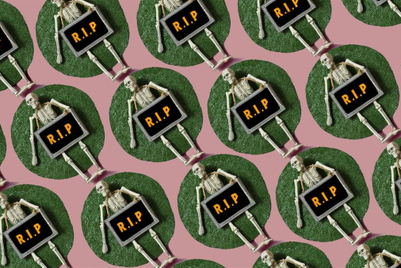
We’ve changed the way we work. We’ve changed the places we work in. This has changed the type of people who work in the industry.
Change is a good thing. But there’s a side effect: We’ve made our industry uninhabitable for some of our most talented people.
We have all been seduced by the extrovert ideal. We’ve set up our modern workplace for the effervescent, exuberant, gregarious "ad guy". This has made life worse for a certain type of person. The introvert. And from the agencies I’ve worked in, that’s a lot of people. And a lot of the best ones at that.
This only occurred to me a few months ago. Me of all people. My comfort with solitude has often freaked some people out. I thought about the personality make-up of most of the creatives I work with.
Put on the spot, I’d say the majority are introverted by nature. The two major personality traits are defined by different responses to stimulation.
We are forcing our key workers into alien environments and then asking them to perform the best work of their lives. In short, we’re asking introverts to act like extroverts.
But social situations can be draining for them. It’s not as simple as either/or. Many of us sit on a sliding scale between the two.
Introverts struggle in today’s team-based, open-plan culture, where talking first, talking fast and talking loud are the name of the game.
My concern is that we have created a culture that works brilliantly. Brilliantly for half of us. Which is not the way to get the best out of the rest.
Indulge me in this—not nearly used enough—agriculture/advertising analogy: To make bigger yields, farmers modernised. They did this by removing the hedgerows to let the machines in. Removing the hedgerows meant the bees that pollinated the crops disappeared. And we’ve all seen the Honey Nut Cheerios "#bringbackthebees" campaign, so we all know how fucked we are when the bees leave town. Allowing for some poetic massaging of the science bit, I think you get my drift.
One of the biggest challenges of any business is to retain and bring out the best in its employees. If many of the workers tasked with creating our product are introverted, then our strategy of creating environments and ways of working that repel them seem not just counterintuitive but ultimately damaging.
We are forcing our key workers into alien environments and then asking them to perform the best work of their lives. In short, we’re asking introverts to act like extroverts. No wonder there’s a brain drain.
Extrovert energy in agencies can be overwhelming and exhausting to the point where we lose, fire or never even attract the best people in the first place. It’s no wonder minds like these feel safer in innovation and tech.
And these minds rarely achieve roles of leadership. If setting goals, maintaining the status quo, exuding certainty and making speeches aren’t your thing, then you’re not in contention. It’s time to recognise that introverted traits have long been undervalued in business. And time to redress the balance. Where better to start than at the top?
Tech is in the age of the introverted entrepreneur. Multimillion-dollar global brands led by quiet introverted thinkers—Steve Wozniak, Mark Zuckerberg, Marissa Mayer and Larry Page.
The best agencies I’ve worked in are made up of the smart, self-motivated and highly creative. And I think those types of people are much better served by someone of an introverted disposition as leader.
An introvert’s desire is always to shun the spotlight (remember, it’s uncomfortable and energy-sapping) and shine it on others.
An introverted leader will listen, take in ideas and help employees shine. They give freedom to others to dream up and implement new ideas.
William McKnight, an introvert himself and president of 3M during the 1940s, said he "hired good people and left them alone" and told workers to dedicate 15% of their time to self-initiated projects.
A majority of the inventions that 3M rely on today (such as Post-it notes) were created in those times – periods of "experimental doodling".
Perhaps it’s time for a role reversal. For extroverts to behave more like introverts. Or at least to recognise the value that introverts bring.
Ultimately, that’s just good management. Recognise that people are different, understand that and use it to get the best out of them. Introvert or extrovert, the best thing any of us can offer up is something different, however we do it.
Andy Jex is executive creative director at Saatchi & Saatchi London


.jpg&h=334&w=500&q=100&v=20250320&c=1)
.jpg&h=334&w=500&q=100&v=20250320&c=1)

.png&h=334&w=500&q=100&v=20250320&c=1)

.png&h=334&w=500&q=100&v=20250320&c=1)

.jpg&h=334&w=500&q=100&v=20250320&c=1)









.png&h=268&w=401&q=100&v=20250320&c=1)